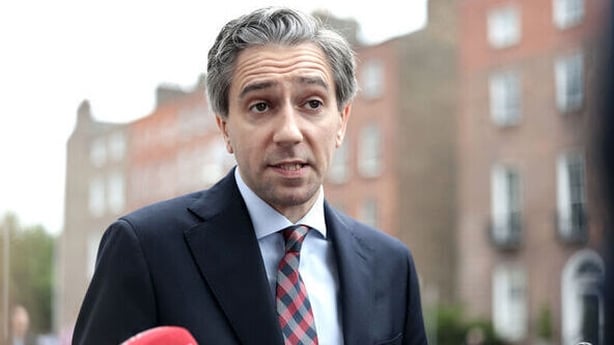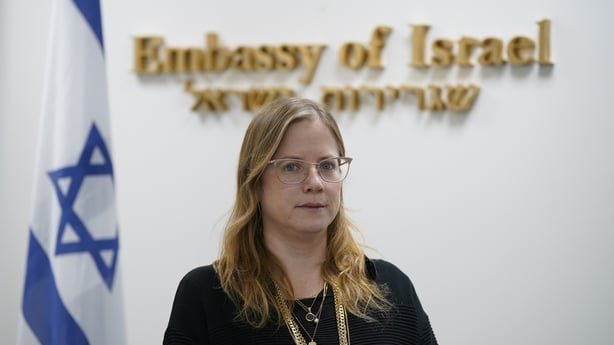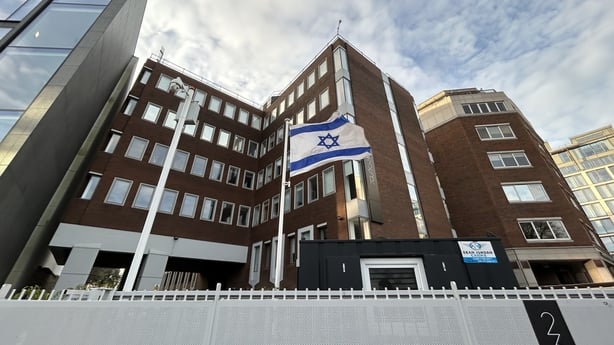Israel's foreign minister has accused Taoiseach Simon Harris of anti-Semitism as he defended Israel's decision to close its embassy in Dublin over Ireland's policies.
"There is a difference between criticism and anti-Semitism based on the delegitimisation and dehumanisation of Israel and double standards towards Israel," Israeli Foreign Minister Gideon Saar said in a statement.
He cited Ireland's support for what he called "politicised" proceedings against Israeli leaders by the International Criminal Court as well as Irish support for an action at the International Court of Justice accusing Israel of genocide over its campaign in Gaza.
"Last night Ireland's anti-Semitic Prime Minister Simon Harris said in an interview 'Ireland is not anti-Israel but Ireland is absolutely anti the starvation of children'," Mr Saar said.
He then asked: "Is Israel starving children?"

Mr Saar said Israel was working to enable humanitarian aid to reach Gaza and prevent civilian casualties while he said Hamas was looting aid and using civilians as human shields.
A spokesperson for the Taoiseach said this evening that Mr Harris "will not be responding to personalised and false attacks and remains focused on the horrific war crimes being perpetrated in Gaza, standing up for human rights and international law and reflecting the views of so many people across Ireland who are so concerned at the loss of innocent, civilian lives".
The decision to close the Israeli embassy in Dublin has highlighted Israel's increasing international isolation over the Gaza war, prompted by the 7 October 2023 attack on Israeli communities around Gaza by Hamas-led militants.
The Taoiseach rejected Israel's criticism yesterday, calling the decision to close the embassy deeply regrettable and said Ireland would always stand up for human rights and international law.
Tánaiste Micheál Martin echoed this, saying Ireland's position towards Israel has not been motivated by anything other than respect for international humanitarian law and respect for human rights.
'Crossed lines'

Israeli ambassador to Ireland Dana Erlich has said that a number of recent decisions taken by Ireland is what led to the closure of the Israeli embassy.
Israeli Foreign Minister Gideon Saar announced yesterday that Israel will close its embassy in Dublin in light of what he called "the extreme anti-Israel policies of the Irish Government".
Speaking on RTÉ's News at One, Ms Erlich said that the embassy has seen "a growing incitement and hatred towards anything Israeli" that has "crossed the lines".
"This is not criticism, but this is just pure hatred and obsession that is now also directed to Israelis and the Jewish community," she said.
The ambassador said the decision to close the embassy was the right one.
"It was a tough decision that was not taken lightly, but unfortunately in the current hostile atmosphere in Ireland, fostered by the Irish Government, this is the correct diplomatic decision to take," she said.
Ms Erlich said that she has heard a lot of concerns from the Jewish community and the Israeli community in Ireland.
"We direct those concerned to the Irish Government, the Government that needs to make sure that they are safe, that there is a future for the Jewish community in Ireland.
"These assurances need to be made."
We need your consent to load this rte-player contentWe use rte-player to manage extra content that can set cookies on your device and collect data about your activity. Please review their details and accept them to load the content.Manage Preferences
Ms Erlich stressed that a surge in antisemitism over the last year was among the factors in Israel's decision.
"We didn’t hear any public statements or commitments for the safety of the Jewish and Israeli communities.
"We will continue helping the Jewish and Israeli communities.
"We will continue to be in contact with our allies and supporters but the format of the embassy needs to change in light of these anti-Israeli steps."
She was also critical of Ireland’s decision to intervene in South Africa’s case against Israel at the International Court of Justice (ICJ).
"This is an abuse of the international multilateral system by South Africa," said Ms Erlich.
"We were sorry to see Ireland join it, but this joins an accumulation of steps, rhetoric and initiatives that we’ve seen Ireland trying to promote this past year."

Ms Erlich said that Ireland is "an extreme voice in the international arena".
"Unfortunately in the past year, we’ve seen Ireland position itself in an extreme position, that no other country has put itself.
"In most countries, again, we have difficult conversations and we have disagreements.
"We accept criticism. But this has gone over that line in Ireland."
Ms Erlich said that while is still no timeline for the closure of the embassy, the decision did not mean the end of Israel’s relations with Ireland.
"For any diplomatic relation, we also value the pros, cons and benefits of our physical presence in a country.
"In a country that we see, for lack of a better word, an obsession against anti-Israeli steps, it's not about pro co-existence, it's not about pro peace, it's not about co-existence, it's not about improving the lives of the people in the region, but it's about isolating Israel.
"We will take those efforts into another country. We will not be breaking the relations with Ireland, it’s important to emphasise," she added.
We need your consent to load this rte-player contentWe use rte-player to manage extra content that can set cookies on your device and collect data about your activity. Please review their details and accept them to load the content.Manage Preferences
Jewish council 'deeply concerned' by closure of embassy
Meanwhile, the chairperson of the Jewish Representative Council of Ireland has said he is "deeply concerned" by the deterioration in relations between Ireland and Israel following Israel's decision yesterday to close its embassy in Ireland.
Maurice Cohen said the Irish Government’s intervention in the International Court of Justice case which accuses Israel of genocide risks "oversimplifying a highly complex and tragic conflict, unfairly isolating Israel, and undermining the integrity of the term 'genocide'".
Mr Cohen said that the closure of the embassy in Ireland is "particularly distressing for the Jewish community in Ireland".

He said: "For these individuals, the closure of the embassy represents not only a symbolic blow but also a practical disadvantage.
"Consular services provided by the embassy are vital for those maintaining connections with family, culture, and heritage in Israel. Losing this resource will leave many feeling unsupported and aggrieved.
"Closing the embassy risks alienating a significant segment of Irish society and sends a message that dialogue is being replaced by disengagement."
He added that the Jewish Representative Council of Ireland reaffirms its commitment to peace and the protection of innocent lives "on all sides of the Israeli-Palestinian conflict", while also supporting Israel’s right to defend itself from "terrorism and existential threats".
Mr Cohen called on both the Irish and Israeli governments to seek pathways to rebuild trust and to ensure avenues for diplomatic engagement remain open.
Martin says Irish position motivated by respect for humanitarian law
The Tánaiste said Ireland's actions regarding the Middle East are motivated by international humanitarian law and human rights.
He was responding to comments by Ireland’s Chief Rabbi Yoni Wieder, who said "many Israelis living here feel that Ireland is incredibly hostile towards Israel".
Speaking on his arrival at a meeting of EU foreign ministers in Brussels, Mr Martin said: "Any action that the Irish Government has taken in respect to the Middle Eastern issues, and particularly in terms of the war in Gaza, has not been motivated in anything other than respect for international humanitarian law, respect for human rights.
"We have consistently called for an immediate ceasefire, release of all hostages, and a massive surge of humanitarian aid."
The Tánaiste said Ireland’s decision - alongside Norway and Spain - of recognising the State of Palestine was "not a hostile act" and should not be seen as one.
He told reporters: "The utilisation of the international courts by Ireland, such as the ICJ or indeed the ICC, where we have supported those courts, where there can be international accountability for war crimes in any part of the world, including in Gaza, should not be seen as a hostile act.
"Ireland stands by the approach it has taken, which has been motivated, as I have said, towards full accountability for what is happening in Gaza and for respect for international humanitarian law and human rights. That applies to Hamas, that has applied to Hezbollah and to the Israeli Government as well."
Asked how Ireland might rebuild diplomatic relations with Israel, Mr Martin said the first step was for the war in Gaza to end.
"We believe passionately that there's an alternative route now. And we would say to Israel and to all concerned, to open up Gaza to the international community, to allow the international community in, to allow the media in, to bear witness to what is happening," Mr Martin said.
Additional reporting Tony Connelly

